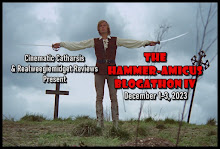
Businessman down on his luck decides to hire a killer for himself to ensure his loved ones are taken care off through the insurance. When his luck surprisingly turns he finds it impossible to cancel the contract and in a desperate race against time trying to stop his own murder learns what life truly is about.
If my constant yabberings about Hammer Noir often not truly being Noir have become repetitive, rejoice... cause
Paid to Kill is quintessential Noir material. In actual fact it is so quintessential that it borders on the unoriginal as this kind of story had been filmed before and since, yet this is such a nicely paced and at times very atmospheric production that the stereotypical story is easily forgotten.
Besides when were any of the “Man hires his own Killer” stories ever truly original? Even
The Whistler (1944), one of my favourite films of this kind (and a film and subsequent series that screams out for a proper DVD release), only rehashes the plot of Jules Verne's TRIBULATIONS OF A CHINAMAN IN CHINA, to the best of my knowledge the main source for all the subsequent adaptations. (One of these days someone needs to compile a proper list of those movies.)
When every single film with this plot device is nothing but a cheap but undisclosed rehash of a classic novel, then I can of course easily forgive Hammer for also falling on this band wagon. Besides this film does have a unique twist that I won't give away, but that is absolutely ruined by the liner notes of this DVD. So kids, if you don't want your surprise spoilt, refrain from reading anything about it on the DVD cover.
What makes this production so intriguing is the fact that, bar the ever faithful yet long suffering secretary with a crush on the boss, pretty much all the characters are morally dubious. Dane Clark in his third and final Hammer outing proves again that he is the company's quintessential Noir antihero and plays a ruthless businessman who, though madly in love with his wife, ignores her and actively pushes her into the arms of a fellow colleague. The guy he hires is an old friend yet he has no hesitation to use blackmail to force him into committing this atrocious deed. Another board member serves as the film's moral compass, yet is not averse to accepting dividend payments despite his ethical qualms. It's all a wonderfully murky environment courtesy of Hungarian born writer Paul Tabori, a very successful writer of pulp fiction novels and anthologies. (One of his books carries the bizarre title SOCIAL HISTORY OF RAPE. You can tell it's a product from the 1970s.)
Director Montgomery Tully was born in Dublin which may explain the fact that in one short scene we see Clark exiting an Aer Lingus plane, one of the first depictions of the Irish airline in a movie that I can ever recall. (Forgive me for geeking out on this aspect.) Clark also shot Hammer's
36 Hours/Terror Street and
The Glass Cage/The Glass Tomb.
Jimmy Sangster was Assistant Director, but – hey – what's new?
Look out for Charles Hawtrey in a non-speaking pre-Carry On role. Looking through his
IMDB entry I am surprised just how long he appeared in uncredited cinematic roles before he finally started to receive anything resembling decent parts. We are talking decades here with a first appearance in a 1922 picture. Call me impressed. He doesn't seem to have ever given up.
Overall
Paid to Kill is a fairly enjoyable and moody film that must rank as one of Hammer Noir's finest. In actual fact one shot of a darkly lit alley proved so effective that it rightly served as the background image for the DVD covers.




















































